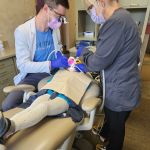- 1-understanding-tooth-sensitivity-to-cold-drinks
- 2-common-causes-of-tooth-sensitivity-to-cold
- 3-how-to-identify-the-symptoms-and-risk-factors
- 4-real-life-examples-showing-the-impact
- 5-professional-treatment-and-prevention-methods
1. Understanding Tooth Sensitivity to Cold Drinks
Tooth sensitivity to cold drinks is a common dental problem that can range from mild discomfort to sharp pain when consuming cold beverages. This sensitivity arises when the protective layers of the tooth—enamel and dentin—are compromised, allowing external stimuli like cold liquids to trigger nerve endings inside the tooth.
While occasional sensitivity might not be alarming, persistent discomfort can affect daily life and indicate underlying dental issues. Understanding what causes tooth sensitivity to cold drinks is the first step toward effective relief and protection.
2. Common Causes of Tooth Sensitivity to Cold Drinks
Several factors can contribute to tooth sensitivity when drinking cold liquids, including:
Enamel Erosion: Acidic foods, beverages, and aggressive brushing can wear down enamel, exposing dentin, which is more sensitive.
Gum Recession: When gums pull away from teeth, root surfaces become exposed, lacking enamel protection and resulting in sensitivity.
Tooth Decay or Cavities: Decay creates openings in the tooth structure, allowing cold stimuli to reach nerves.
Cracked or Fractured Teeth: Damage to tooth integrity can expose inner tissues, causing sharp sensitivity to cold drinks.
Recent Dental Procedures: Treatments like whitening, fillings, or cleanings may temporarily increase sensitivity.
Understanding the Role of Dentin and Nerve Endings
The dentin layer beneath enamel contains tiny tubules that lead directly to the nerves inside the tooth. When enamel is lost or gums recede, cold drinks can travel through these tubules, stimulating nerve endings and causing pain or discomfort. This biological mechanism explains why cold beverages often trigger sensitivity more than other stimuli.
3. How to Identify the Symptoms and Risk Factors
Typical symptoms of tooth sensitivity to cold drinks include sudden sharp pain or a lingering ache after consuming cold liquids. This reaction is usually brief but intense, and may be accompanied by sensitivity to hot, sweet, or acidic foods.
Risk factors include poor oral hygiene, frequent consumption of acidic or sugary drinks, aggressive tooth brushing, teeth grinding, and aging. Smokers and people with gum disease also face increased sensitivity risks.
Case Study: A Busy Professional’s Experience
Laura, a marketing executive from New York, noticed increasing discomfort each time she drank iced coffee during her workday. Initially dismissing it as minor, the pain grew sharper, affecting her enjoyment and focus. Upon visiting her dentist, she learned that enamel erosion from frequent acidic drinks and vigorous brushing had caused her sensitivity. Her story reflects how lifestyle habits can unknowingly contribute to tooth sensitivity and underscores the importance of timely dental care.
4. Real-Life Examples Showing the Impact of Cold Sensitivity
Many people share experiences similar to Laura’s, where everyday activities like drinking cold water, enjoying smoothies, or eating ice cream become uncomfortable. This sensitivity not only causes physical pain but can also affect emotional well-being, leading to avoidance of certain foods or social situations.
Another example is James, an avid fitness enthusiast who relied on cold protein shakes but developed sensitivity that interfered with his routine. With proper dental consultation and lifestyle changes, he managed to restore comfort without sacrificing his nutritional habits.
5. Professional Treatment and Prevention Methods
Addressing tooth sensitivity to cold drinks requires both professional care and lifestyle adjustments. Dentists may recommend:
Desensitizing Toothpaste: Special formulations help block nerve signals and strengthen enamel.
Fluoride Treatments: Applied in-office or prescribed for home use to rebuild enamel and reduce sensitivity.
Dental Procedures: For severe cases, bonding, sealants, or gum grafts may be necessary to protect exposed areas.
Advice on Oral Hygiene: Gentle brushing with a soft-bristled brush, avoiding acidic foods, and regular cleanings can prevent worsening sensitivity.
For personalized solutions and the best products to manage tooth sensitivity, visiting Dentistry Toothtruth is a wise choice. Their expert recommendations and trusted services help patients regain comfort and enjoy cold drinks without pain.







 Farrow Orthodontics - City Center5.0 (458 review)
Farrow Orthodontics - City Center5.0 (458 review) Smiles Orthodontics4.0 (158 review)
Smiles Orthodontics4.0 (158 review) Gentle Dental Rio Vista4.0 (152 review)
Gentle Dental Rio Vista4.0 (152 review) North Shore Smiles Pediatric Dentistry5.0 (52 review)
North Shore Smiles Pediatric Dentistry5.0 (52 review) Southill Dental Group5.0 (364 review)
Southill Dental Group5.0 (364 review) David K Buran, DMD5.0 (107 review)
David K Buran, DMD5.0 (107 review) The Importance of Oral Health Education During Pregnancy for a Healthy Pregnancy
The Importance of Oral Health Education During Pregnancy for a Healthy Pregnancy Best Tips for Brushing Your Teeth Properly for Healthy Gums: Essential Techniques for Oral Health
Best Tips for Brushing Your Teeth Properly for Healthy Gums: Essential Techniques for Oral Health Why Skipping Dental Checkups Can Lead to Bigger Oral Health Problems
Why Skipping Dental Checkups Can Lead to Bigger Oral Health Problems Advantages of Porcelain Dental Restorations
Advantages of Porcelain Dental Restorations How Can Diabetes Cause Tooth and Gum Problems? Preventing and Managing Oral Health Issues
How Can Diabetes Cause Tooth and Gum Problems? Preventing and Managing Oral Health Issues Healthy Habits for Promoting Good Oral Health and Hygiene: Tips for a Healthy Smile
Healthy Habits for Promoting Good Oral Health and Hygiene: Tips for a Healthy Smile